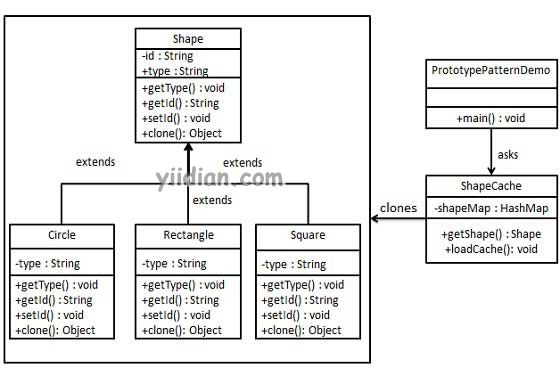Java原型模式
1 Java原型模式的介绍
原型模式指在创建重复对象的同时保持性能。 这种类型的设计模式属于创建模式,因为此模式提供了创建对象的最佳方法之一。
这个模式涉及实现一个原型接口,它只创建当前对象的克隆。有时直接创建对象时使用这种模式是昂贵的。例如,在昂贵的数据库操作之后创建对象。因此我们可以缓存对象,在下一个请求时返回其克隆,并在需要时更新数据库,从而减少数据库调用。
2 Java原型模式的好处
原型模式的主要优点如下:
- 它减少了子分类的需要。
- 它隐藏了创建对象的复杂性。
- 客户可以在不知道对象是哪种类型的情况下获取新对象。
- 它使您可以在运行时添加或删除对象。
3 Java原型模式的用法
- 在运行时实例化类时。
- 当创建对象的成本昂贵或复杂时。
- 当您希望使应用程序中的类数保持最少时。
- 当客户端应用程序不需要知道对象的创建和表示时。
4 Java原型模式的UML

5 Java原型模式的案例
5.1 创建一个实现Clonable接口的抽象类
Shape.java:
/**
* 一点教程网: http://www.yiidian.com
*/
public abstract class Shape implements Cloneable {
private String id;
protected String type;
abstract void draw();
public String getType(){
return type;
}
public String getId() {
return id;
}
public void setId(String id) {
this.id = id;
}
public Object clone() {
Object clone = null;
try {
clone = super.clone();
} catch (CloneNotSupportedException e) {
e.printStackTrace();
}
return clone;
}
}
5.2 创建扩展上述类的具体类
Rectangle.java:
public class Rectangle extends Shape {
public Rectangle(){
type = "Rectangle";
}
@Override
public void draw() {
System.out.println("Inside Rectangle::draw() method.");
}
}
Square.java:
/**
* 一点教程网: http://www.yiidian.com
*/
public class Square extends Shape {
public Square(){
type = "Square";
}
@Override
public void draw() {
System.out.println("Inside Square::draw() method.");
}
}
Circle.java:
public class Circle extends Shape {
public Circle(){
type = "Circle";
}
@Override
public void draw() {
System.out.println("Inside Circle::draw() method.");
}
}
5.3 创建一个类来获取具体的类,并将它们存储在Hashtable中
ShapeCache.java:
/**
* 一点教程网: http://www.yiidian.com
*/
import java.util.Hashtable;
public class ShapeCache {
private static Hashtable<String, Shape> shapeMap = new Hashtable<String, Shape>();
public static Shape getShape(String shapeId) {
Shape cachedShape = shapeMap.get(shapeId);
return (Shape) cachedShape.clone();
}
// for each shape run database query and create shape
// shapeMap.put(shapeKey, shape);
// for example, we are adding three shapes
public static void loadCache() {
Circle circle = new Circle();
circle.setId("1");
shapeMap.put(circle.getId(),circle);
Square square = new Square();
square.setId("2");
shapeMap.put(square.getId(),square);
Rectangle rectangle = new Rectangle();
rectangle.setId("3");
shapeMap.put(rectangle.getId(), rectangle);
}
}
5.4 使用ShapeCache类来获取存储在Hashtable中的形状(shape)的克隆
PrototypePatternDemo.java:
/**
* 一点教程网: http://www.yiidian.com
*/
public class PrototypePatternDemo {
public static void main(String[] args) {
ShapeCache.loadCache();
Shape clonedShape = (Shape) ShapeCache.getShape("1");
System.out.println("Shape : " + clonedShape.getType());
Shape clonedShape2 = (Shape) ShapeCache.getShape("2");
System.out.println("Shape : " + clonedShape2.getType());
Shape clonedShape3 = (Shape) ShapeCache.getShape("3");
System.out.println("Shape : " + clonedShape3.getType());
}
}
5.5 验证输出
Shape : Circle
Shape : Square
Shape : Rectangle
热门文章
优秀文章


